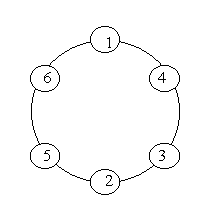Prime Ring Problem
来源:互联网 发布:家庭千兆网络组建方案 编辑:程序博客网 时间:2024/05/17 11:32
Prime Ring Problem
Time Limit: 4000/2000 MS (Java/Others) Memory Limit: 65536/32768 K (Java/Others)Total Submission(s): 29687 Accepted Submission(s): 13241
Problem Description
A ring is compose of n circles as shown in diagram. Put natural number 1, 2, ..., n into each circle separately, and the sum of numbers in two adjacent circles should be a prime.
Note: the number of first circle should always be 1.

Note: the number of first circle should always be 1.

Input
n (0 < n < 20).
Output
The output format is shown as sample below. Each row represents a series of circle numbers in the ring beginning from 1 clockwisely and anticlockwisely. The order of numbers must satisfy the above requirements. Print solutions in lexicographical order.
You are to write a program that completes above process.
Print a blank line after each case.
You are to write a program that completes above process.
Print a blank line after each case.
Sample Input
68
Sample Output
Case 1:1 4 3 2 5 61 6 5 2 3 4Case 2:1 2 3 8 5 6 7 41 2 5 8 3 4 7 61 4 7 6 5 8 3 21 6 7 4 3 8 5 2
Source
Asia 1996, Shanghai (Mainland China)
思路:下面这个程序是我之前写的,超时了,思路可能就是大众思路,next_permutation函数,所给的数排列,连续两个数判断是不是素数,是的话,计数加1,还有最后一个数和第一个数加在一起判断是不是素数,是计数加1,最后计数和这些数个数相等时,说明构成的是素数环。但是这是超时的。。所以该怎么办呢。。上网搜了一下,这是一道深搜dfs问题,我只能说关于dfs自己根本不会写,看别人代码,用很长时间才能明白什么意思,这类题型还是很生的。这道题深搜,大意是:
例如:n=4,先判断2访问过没有并且2加p[0](即是1)是不是素数,如果是的话,就把2赋给p[1],2标记为已访问,然后再调用dfs(2,4),此时2已被访问过,就判断3,没访问,而且3+p[1]是素数,把3赋给p[3],3被标记,调用dfs(3,4),2,3都已经访问,判断4,4<=4,然后4+p[2]仍是素数,那么把4赋给p[3],标记访问过,调用dfs(4,4)此时,再判断p[0]与p[n-1],仍是素数,那么就输出1 2 3 4。因为2,3,4都被访问过,所以dfs(4,4)调用结束,4恢复没有被标记。接着是1,2,4(不满足),
1,3(不满足)1,4,2(不满足)1,4,3,2(满足)输出。这个dfs方法比较抽象。。
参考博客来源:http://blog.csdn.net/niushuai666/article/details/7365189
代码如下(2个):
#include<iostream>//超时代码my code
#include<stdio.h>#include<algorithm>#include<cmath>using namespace std;int sushu(int x){ if(x==2||x==3) return 1; if(x==1) return 0; int i,pan=0; for(i=2;i<x;i++) { if(x%i==0) { pan=1; break; } } if(pan==0) return 1; else return 0;}int main(){ int n,i,ji=1; int a[20]; while(~scanf("%d",&n)) { printf("Case %d:\n",ji++); for(i=0;i<n;i++) a[i]=i+1; do { int count=0; if(a[0]==1) { for(i=0;i<n-1;i++) { if(sushu(a[i]+a[i+1])) count++; } if(sushu(a[0]+a[n-1])) count++; if(count==n) { for(i=0;i<n-1;i++) cout<<a[i]<<" "; cout<<a[i]<<endl; } } else break; }while(next_permutation(a,a+n)); cout<<endl; } return 0;}<pre class="cpp" name="code">#include<iostream>//dfs深搜ac代码 my codeinclude<stdio.h>#include<math.h>#include<string.h>using namespace std; bool isprime[40];int visited[40];int p[40]={1};void dfs(int start,int n){ int i; if(start==n && isprime[p[0]+p[n-1]]) { for(i=0;i<n-1;i++) cout<<p[i]<<" "; cout<<p[i]<<endl; } for(i=2;i<=n;i++) { if(!visited[i] && isprime[i+p[start-1]]) { visited[i]=1; p[start]=i; dfs(start+1,n); visited[i]=0; } }}int main(){ memset(isprime,true,sizeof(isprime)); int i,j,d,n,count=1; d=static_cast<int>(sqrt(40.0)); isprime[0]=false;isprime[1]=false; for(i=2;i<d;i++) { if(isprime[i]) for(j=i*i;j<40;j+=i) isprime[j]=false; } while(scanf("%d",&n)!=EOF) { memset(visited,0,sizeof(visited)); printf("Case %d:\n",count++); int start=1; if(n==1) { cout<<"1"<<endl; continue; } if(n&1) continue; dfs(start,n); cout<<endl; } return 0;} 0 0
- 1016 Prime Ring Problem
- HDOJ1016-Prime Ring Problem
- HDU1016 Prime Ring Problem
- DFS__1195: Prime Ring Problem
- Prime Ring Problem
- 1016:Prime Ring Problem
- 1016 Prime Ring Problem
- HDUOJ1016 Prime Ring Problem
- 1016 Prime Ring Problem
- Prime Ring Problem
- hdu1016 Prime Ring Problem
- Prime Ring Problem(dfs)
- Prime Ring Problem
- Prime Ring Problem
- Prime ring problem
- hdu1016-Prime Ring Problem
- HDU1035 Prime Ring Problem
- 1016Prime Ring Problem
- 一款经典简洁的CSS滑动门代码
- Cocos2dx中新头文件无法被找到的问题
- Popular Cows - POJ 2186 Tarjan
- HDU 1281解题报告
- 互联网催生新学科-互联网神经学
- Prime Ring Problem
- Android Studio安装后Fetching android sdk component information超时的解决方案
- 基于bootstrup的jQuery超酷hero幻灯片特效
- HTML5实现Winamp2.9音频播放器插件
- HDU 2157解题报告
- pat1069 The Black Hole of Numbers
- ORACLE 10G 官方文档演示:查找手工建库语句
- 动态数组使用
- 3T 硬盘读写速度小测


